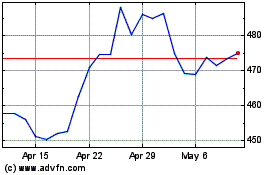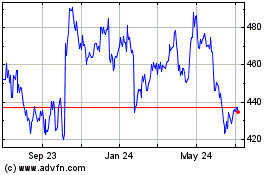Corporate Winners and Losers Emerge After Trump Win
November 09 2016 - 5:40AM
Dow Jones News
LONDON—Amid the global market turbulence following Donald
Trump's surprise presidential election victory, some early
corporate winners and losers were emerging in European stock
markets.
U.S. stock futures plunged overnight on the surprise Trump win,
and most global indexes were also down sharply. The Nikkei stock
index was down 3%, while the FTSE 100 index of British blue chips
was down 0.2%. Still, some investors were taking early cues to pick
possible beneficiaries.
Pharmaceutical stocks shot higher in Europe, after being weighed
down for months by the prospect of a pricing crackdown in the
U.S.—one of the industry's most lucrative markets—threatened by a
Hillary Clinton presidency. Pharmaceutical companies also are
widely regarded as a haven during periods of political turmoil.
GlaxoSmithKline PLC and AstraZeneca PLC were both up about 2% in
early London trading.
Some mining companies also rose early in Europe. Gold prices
were soaring on safe-haven buys. Mr. Trump has been outspoken in
his support of coal miners in the U.S.—a sentiment that might be
reverberating more broadly among shares of the world's more
diversified miners. Mr. Trump has also been broadly skeptical of
energy-industry regulation that has weighed on oil, gas and other
extractive resources companies for years.
Still, most big oil firms, including BP PLC and Royal Dutch
Shell PLC, were down sharply early in London after oil markets took
a big hit amid the wider market upheaval.
BAE Systems PLC, Europe's biggest arms maker, rose early
Wednesday. Mr. Trump had signaled before his election victory that
European members of the North Atlantic Treaty Organization would
have to contribute more to their own defense.
Whether any of these moves end up being knee-jerk reactions, or
early signals of which global sectors may benefit from a Trump
presidency, is far from clear. Many of Mr. Trump's policy
statements so far have been vague and open to interpretation, and
he has been known to swerve on positions radically.
But because the U.S. is the world's biggest economy—and the
biggest market for many of the things the rest of the world
makes—executives and investors were scrambling early Wednesday to
work out who might best be poised to profit from his win, or lose
out.
For many investors and executives, a Clinton victory was
expected to provide more immediate clarity about key
business-related policy initiatives in a new administration. That
is despite the fact that on the campaign trail, she has targeted
big businesses—including pharmaceuticals firms—as ripe for
scrutiny.
Mr. Trump, meanwhile, has been more outspoken on the campaign
trail than Mrs. Clinton about the pitfalls of global trade deals,
and has vowed to roll them back. That has spooked global executives
who have pushed expanded global trade.
Underscoring the new uncertainty surrounding global business,
Germany's industry federation BDI warned early Wednesday of
"massive uncertainties in the economy" after the victory of Donald
Trump in the U.S. presidential election, and the business group
called on the president-elect not to close off the U.S. from the
rest of the world.
"Donald Trump is well advised not to shut off the U.S. economy
from the world or else the uncertainty about the future course will
lead to considerable negative effects on the global economy," BDI
President Ulrich Grillo said. The U.S. is Germany's largest export
market. Some 5,000 German firms have operations in the U.S.,
according to the BDI.
Specific reaction from company executives around the world has
been muted so far. A group of CEOs in the U.S. issued a joint
letter early Wednesday pledging to promote "healing and
reconciliation."
In an open letter to President-elect Donald Trump, CEOs
affiliated with the National Association of Manufacturers, a trade
group in Washington, wrote, "we can be constructive—both when we
agree and when we do not—if we can all approach challenging
situations in good faith, guided by an unwavering commitment to a
greater purpose."
The letter was organized by the National Association of
Manufacturers, a major Washington trade group. The more than 1,100
signers included Dennis A. Muilenburg of Boeing Co., Wes Bush, CEO
of Northrop Grumman Corp., David Taylor, CEO of Procter &
Gamble Co. and Gregory Hayes of United Technologies Corp.
(END) Dow Jones Newswires
November 09, 2016 05:25 ET (10:25 GMT)
Copyright (c) 2016 Dow Jones & Company, Inc.
Northrop Grumman (NYSE:NOC)
Historical Stock Chart
From Mar 2024 to Apr 2024

Northrop Grumman (NYSE:NOC)
Historical Stock Chart
From Apr 2023 to Apr 2024
